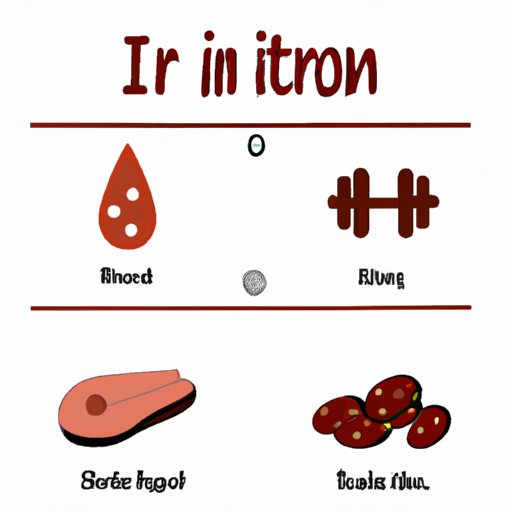
Introduction
Iron is an essential nutrient that plays a crucial role in maintaining optimal health and wellbeing. This nutrient is necessary for a wide range of bodily functions, including aiding in oxygen transport, immune function, and cognitive development.
When it comes to understanding essential nutrients, it’s crucial to differentiate between vitamins and minerals. In this article, we’ll explore the importance of iron as a mineral and clarify the misconception that iron is a vitamin.
Iron: The Mighty Mineral That Keeps You Healthy
Iron is a mineral that is necessary for the red blood cells to transport oxygen from the lungs to the rest of the body. It aids in cell growth, maintaining healthy skin, hair and nails as well as supporting the immune system, cognitive and muscle function. Iron also helps to produce hemoglobin, which is responsible for making red blood cells, and myoglobin, a protein found in muscle cells, which binds oxygen, enabling oxidative metabolic processes.
Vitamin vs Mineral: Understanding the Difference Between Iron and Other Essential Nutrients
Vitamins and minerals are both essential nutrients required by the body to function properly. Vitamins are organic compounds that must be obtained through the diet or supplementation, whereas minerals are inorganic compounds found in rocks, soil, and water, which are abundant in the human diet. Unlike vitamins, minerals cannot be synthesized by the body, and therefore, must be obtained through the diet or supplements.
When we compare essential nutrients like iron to other vitamins and minerals, we discover each has distinct functions in the body and cannot be substituted for one another. For instance, while Vitamin C is essential for immune function and collagen synthesis, it cannot perform the same tasks as iron in the body, including oxygen transport and muscle function.
All You Need to Know About Iron: Is it a Vitamin or Mineral, and Why Does it Matter?
Iron is an essential mineral required by the body, and it is not a vitamin. This important nutrient can be found in two forms, heme iron, and non-heme iron, which are both derived from different sources. Heme iron is derived from animal-based products like red meat, fish, and poultry, while non-heme iron comes from plant-based food sources, including legumes, leafy greens, and grains.
Understanding iron as a mineral rather than a vitamin is a critical distinction to make when it comes to making dietary choices. As a mineral, iron cannot be synthesized by the body, and therefore, must be obtained through food or supplements. Consuming diets that are low in iron can lead to anemia or low blood oxygen levels, which can cause fatigue, weakness, and other health problems.
The Top Benefits of Iron: Why This Essential Mineral Should Be Part of Your Daily Diet
Iron is an essential nutrient that offers numerous health benefits. One of the primary benefits of iron is its ability to support muscle activity and promote metabolism. Iron also helps to maintain healthy hair and skin levels, regulate body temperature, and support overall immune function. Additionally, iron requirements can vary based on age and gender. It is especially important for pregnant women to consume adequate levels of iron to support the growth and development of their baby.
Iron Deficiency Anemia: What You Need to Know About the Symptoms, Causes, and Treatment
Iron deficiency is the most common nutritional deficiency worldwide, which can lead to iron-deficiency anemia when the body does not have enough iron to produce red blood cells. Iron-deficiency anemia can cause fatigue, weakness, shortness of breath, headaches, and other health issues. Lack of iron intake and absorption, heavy periods or internal bleeding can cause iron deficiency anemia.
In addition to consuming iron-rich foods or supplements, precautions can be taken to prevent iron-deficiency anemia. It is recommended to consume iron-rich foods with vitamin C to aid in absorption, avoiding coffee and tea, which can inhibit iron absorption, and opting for iron cookware to prepare food.
Maximizing Your Iron Intake: A Complete Guide to Foods, Supplements, and Best Practices
There are numerous ways to maximize your iron intake in your diet. Iron can be found in animal-based food sources like red meat, poultry, and fish, as well as plant-based food sources, including leafy greens, legumes, grains, and fortified cereals. It is important to consider the bio-availability of the iron in different food sources. Heme-iron found in animal-based products has a higher bioavailability compared to non-heme iron in plant-based products. Combining non-heme iron foods with vitamin C-rich foods like citrus fruit can boost iron absorption.
If necessary, iron supplements can be used under the guidance of a healthcare professional. Different types of supplements like iron salts and carbonyl iron can be used, and the dosage may vary based on the individual’s unique needs.
The Role of Iron in a Balanced Diet: How Much You Need, Where to Get It, and What to Watch Out For
Consuming a balanced diet that includes adequate levels of iron is essential for overall health and wellbeing. The iron intake requirements vary based on age, gender, and life stage. Infants, growing children, and pregnant women require higher levels of iron intake compared to non-pregnant women and men. Consuming a balanced diet that includes iron-rich foods along with vitamin C and avoiding substances that inhibit iron absorption can support optimal health.
Conclusion
Iron is a mineral that plays a crucial role in maintaining optimal health and wellbeing. It is important to understand that iron is a mineral and not a vitamin and cannot be synthesized by the body. Consuming adequate levels of iron through food or supplements is essential to avoid iron deficiency anemia and support various bodily functions. Understanding the distinct functions and sources of different essential nutrients and dietary considerations can help make better dietary choices, leading to optimal health and wellbeing.





